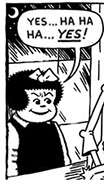|
Vampire.
|
|
|
|

|
| # ? Jun 11, 2024 18:36 |
|
Finally, a movie about the making of 7th Sea: https://www.youtube.com/watch?v=PAvug-z7lqM
|
|
|
|
Error 404 posted:Etherwind. Yeah, it's not even from anything I wrote. Since I never hated the thing cited I don't mind much.
|
|
|
|
Upmarket Mango posted:Why is the two-column layout so popular? It loving blows, imo. I don't mind it for 8.5x11 books as long as there are pop-out elements like text boxes. Otherwise I find it a bit annoying for more than couple pf pages.
|
|
|
|
General Ironicus posted:Finally, a movie about the making of 7th Sea: I am glad Alfie Allen will now be typecast as "guy who always fucks up"
|
|
|
|
Majuju posted:So I went to the FLGS and grabbed Skulls and Shackles, and the guys there were psyched about a Shadowrun co-op card game that just came out. Anyone played it? Good? Bad? I like it a lot. It is challenging but some of the missions give you karma to level up your dudes even if you lose. You get enough karma and you get things that will give you a head start in the next one. It can be tough but fun. You can get the pdfs of the demo missions of BGG and those make good starter missions. If you do both of them you have enough karma to get an upgrade that will help in the box's missions.
|
|
|
|
Upmarket Mango posted:Why is the two-column layout so popular? It loving blows, imo. Ars Magica uses a three-column font. Try reading a .PDF of that. I have to be zoomed in at all times practically.
|
|
|
|
General Ironicus posted:Finally, a movie about the making of 7th Sea: Oh my god they they actually say "I lost everything, that dog was a final gift from my dying wife" completely unironically. 
|
|
|
|
Lemon Curdistan posted:Oh my god they they actually say "I lost everything, that dog was a final gift from my dying wife" completely unironically. This is gonna be the best movie ever.
|
|
|
|
It's good to see Alfie Allen has the market cornered on 'insufferable idiot whose stupid mistakes drive the plot'. Not that I'm complaining, but how is this movie related to Trad Games?
|
|
|
|
It's a biopic about the designer of L5R.
|
|
|
|
Zurui posted:It's good to see Alfie Allen has the market cornered on 'insufferable idiot whose stupid mistakes drive the plot'. John Wick is also the name of an (in)famous RPG designer, and also this is the chat thread for chatting.
|
|
|
|
General Ironicus posted:It's a biopic about the designer of L5R. Ah.  Based on a true story, I see.
|
|
|
|
That's a very poorly lit picture. Also the guy looks kind of absurd with the "eeeevil" moustache goatee combo.
|
|
|
|
Davin Valkri posted:That's a very poorly lit picture. Also the guy looks kind of absurd with the "eeeevil" moustache goatee combo. "Poorly", "absurd", and "John Wick" are just such a natural fit.
|
|
|
|
I sure hope the movie doesn't have hours of crap about "blood opera" and horses before getting to the sweet revenge-killing action. If John Wick was actually making this movie, there would be interminably long and pointless scenes about the minutiae of the car the bad guys stole and the particular breeding of Keanu's dog. What I'm saying is the Venn would have been better at revenge if they had muscle cars and shootouts in nightclubs.
|
|
|
|
remusclaw posted:The Issue with the OSR is that everyone in it basically ignores that there there were rules for everything, and that D&D has never been particularly rules light. poo poo OD&D has detailed rules for how long it takes to move a certain distance in the dungeon, how long it takes to search for secret doors and traps, and for how often monsters interrupt you while you are doing this poo poo, so you cant just dawdle around. OD&D in particular seems more game-ist than most OSR people are willing to accept from their RPG's these days. Most of the OSR people I've had contact with see it a bit differently. To them, the OSR is all about old subsystems that actually reinforced gameplay flow (as long as you were doing a dungeon crawl), while scrapping rules that don't. To them, the 'Renaissance' in OSR is bringing back rules as things that try to make a specific playstyle work better rather than just trying to simulate the world in general (like 3e skill systems/WoD/etc try to do). What's funny about this is how indie games were basically coming to the same conclusions about things at the same time/a bit earlier.
|
|
|
|
simonwolf posted:"Poorly", "absurd", and "John Wick" are just such a natural fit. Also 'eeevil' and 'goatee'.
|
|
|
|
General Ironicus posted:It's a biopic about the designer of L5R. I'm just gonna pop in here and point out Wick didn't actually design L5R. He was the story editor, wrote a lot of setting material, and wrote a lot of the RPG corebook, but he didn't really do the CCG or RPG rulesets himself.
|
|
|
|
OtspIII posted:Most of the OSR people I've had contact with see it a bit differently. To them, the OSR is all about old subsystems that actually reinforced gameplay flow (as long as you were doing a dungeon crawl), while scrapping rules that don't. To them, the 'Renaissance' in OSR is bringing back rules as things that try to make a specific playstyle work better rather than just trying to simulate the world in general (like 3e skill systems/WoD/etc try to do). What's funny about this is how indie games were basically coming to the same conclusions about things at the same time/a bit earlier. GM Fiat and GM power seem at times to be a major part of the core message of the OSR, it is certainly the focus of Old School Primer. It points at the rules of modern games and contrasts the way they play out with that of the old school game, showing the modern to play mechanically, slowly, and without drama, and the older game quickly and smoothly, with no need to look up rules to keep the game going. The primer at least presents a viewpoint where old school is low rules, where it really is anything but. I find it amusing that the most vocal of the OSR seem perfectly willing to completely ignore rules they dislike when running old school games, yet they somehow feel that it is impossible to do so with a newer game, as if there is a secret police force out there enforcing BTB play. Mind, I like old school games, just as I like new school games, I don't feel like either type of game existing somehow lessens the other in any way, yet there are people out there who seem to be operating under the premise that modern game design is threatening the life of their dog, and needs to be fought to the death. There could be similar people on the modern gaming side, but I don't have a lot of experience on that corner of the internet. remusclaw fucked around with this message at 05:48 on Sep 13, 2014 |
|
|
|
Well, older games tended to be more... loosely constructed, in a way. Individual rules were easier to peel off because systems tended to be sort of conglomerates of disconnected subsystems, and it wasn't terribly hard to ignore stuff you didn't like, cause it really didn't affect any of the other parts of the game. Nowadays, there's a tendency to more tightly design games as wholes made up of interacting parts, so it's harder to take a part out without disturbing the workings of the other subsystems.
|
|
|
|
I agree to a certain extent, but I have seen the 30+ page houserule documents that often accompanied 2nd ed and older play. The people who played these games back then where often not squeamish about ripping the guts out of a game and replacing them with homemade guts for the sake of making it play their way. Which brings me to something of a disconnect with the OSR. They advocate old school gaming based on a nostalgic way of play that personal experience, the rules of the games they play, and pre year 2000 internet D&D writers refute ever being particularly prevalent. The modern and indy stuff I have played on the other hand seems custom built oftentimes for modularity, Fate, Cortex, Dungeonworld, and Burning Wheel for example seem to suggest ripping them to pieces to make the game you want. remusclaw fucked around with this message at 05:45 on Sep 13, 2014 |
|
|
|
Asymmetrikon posted:Well, older games tended to be more... loosely constructed, in a way. Individual rules were easier to peel off because systems tended to be sort of conglomerates of disconnected subsystems, and it wasn't terribly hard to ignore stuff you didn't like, cause it really didn't affect any of the other parts of the game. Nowadays, there's a tendency to more tightly design games as wholes made up of interacting parts, so it's harder to take a part out without disturbing the workings of the other subsystems. I've always been curious about this. Was old school D&D really as modular as the OSR claims or did the subsystems interact in subtle refined ways but everybody just ignored them and did whatever?
|
|
|
|
Asymmetrikon posted:Well, older games tended to be more... loosely constructed, in a way. Individual rules were easier to peel off because systems tended to be sort of conglomerates of disconnected subsystems, and it wasn't terribly hard to ignore stuff you didn't like, cause it really didn't affect any of the other parts of the game. Nowadays, there's a tendency to more tightly design games as wholes made up of interacting parts, so it's harder to take a part out without disturbing the workings of the other subsystems. Well, it's also because modern games have more focused design where mechanics are about pointing people towards a theme or playstyle rather than just being a task resolution system and nothing else.
|
|
|
|
Old D&D was pretty modular, though it was certainly not always presented that way, as TSR pushed BTB play for the sake of tournament play. It is pretty easy to tear apart though, sometimes rules seem to exist in the state they do for the simple sake of using all the dice. D&D is not a game built off of a task resolution system though, it is a game that seems to consist of hundreds of different little task resolution systems.
|
|
|
|
BrainParasite posted:I've always been curious about this. Was old school D&D really as modular as the OSR claims or did the subsystems interact in subtle refined ways but everybody just ignored them and did whatever? Well, if the stories are to be believed, D&D developed each of its little parts individually when Gygax was confronted with a new game situation that didn't fall under any of the rules that were already established (or at least, the set of rules that the players remembered at the time.) I'd doubt that the subsystems interacted in 'subtle, refined ways' - even newer RPGs can't manage that very well, and they actually attempt to have some kind of unifying system, unlike D&D.
|
|
|
|
People talk a lot of bullshit about old thing they like.
|
|
|
|
The things we love are often the things we are best prepared to comment on, positively or negatively.
|
|
|
|
remusclaw posted:GM Fiat and GM power seem at times to be a major part of the core message of the OSR This is totally true, but I think the big thing to realize is that because there's such an emphasis on Fiat as a task resolution system, there are also way more ways that people moderate it. Te games tend to actually use a bunch of systems specifically to make it easier to Fiat more fairly. The OSR is into things like using dungeons that were mapped out independent of knowing which characters would explore them, or just rolling a d6 to answer questions about the setting instead of just pulling an answer out of your rear end, or even just encouraging players to make a case for why they think a certain ruling doesn't make sense as a means to counterbalance the power of fiat. When you have infinite power to make the world work whatever way you want, it's really hard to be fair if you don't use some degree of randomizer. Otherwise you're just constantly asking yourself "okay, I haven't hosed over the players in a while--should I just arbitrarily make them fail this time?". Stuff like dungeon creation rules, reaction rolls, random tables, and wandering monster checks are all subsystems for basically helping the GM apply challenge and reward in a pattern that's both fair and well paced. Err, I feel like I should make a disclaimer that these are my personal experiences with OSR types, but there are many different types under that one umbrella. I mostly know Basic types, and even by the 2e era most of these concepts were pretty abandoned in AD&D circles. remusclaw posted:Mind, I like old school games, just as I like new school games, I don't feel like either type of game existing somehow lessens the other in any way, yet there are people out there who seem to be operating under the premise that modern game design is threatening the life of their dog, and needs to be fought to the death. There could be similar people on the modern gaming side, but I don't have a lot of experience on that corner of the internet. I think the new school equivalent is that these older games are now obsolete and that the only reason someone would be interested in staying with them is to relive their lost childhood (although to be fair I think I hear this said more about 3e than 1e these days). You get plenty of reflexive tribalism from a small segment of both groups, but it's best to just kind of ignore it in both cases. Asymmetrikon posted:Well, if the stories are to be believed, D&D developed each of its little parts individually when Gygax was confronted with a new game situation that didn't fall under any of the rules that were already established (or at least, the set of rules that the players remembered at the time.) I'd doubt that the subsystems interacted in 'subtle, refined ways' - even newer RPGs can't manage that very well, and they actually attempt to have some kind of unifying system, unlike D&D. Time is actually a really big deal in early D&D, and a whooooole bunch of the various subsystems tie directly or indirectly into it. The rules for wandering monsters, picking locks, searching for secret doors, spell duration, handling players spending longer than is fun fretting over how to most safely perform trivial tasks, lighting, status effects, and making noise all sort of play well together because some of them use time as a consumable resource while others deal with the costs of time passing. I'm not sure 'subtle, refined' is the right way to put it, but there's more thought put into how they work together than, say, the 3e skill list.
|
|
|
|
OtspIII posted:Time is actually a really big deal in early D&D, and a whooooole bunch of the various subsystems tie directly or indirectly into it. The rules for wandering monsters, picking locks, searching for secret doors, spell duration, handling players spending longer than is fun fretting over how to most safely perform trivial tasks, lighting, status effects, and making noise all sort of play well together because some of them use time as a consumable resource while others deal with the costs of time passing. I'm not sure 'subtle, refined' is the right way to put it, but there's more thought put into how they work together than, say, the 3e skill list. I posted the rules for most of that from "The Underworld & Wilderness Adventures" from the OD&D set at the end of the last page, and I do think they are pretty cool, unfortunately I don't think they were brought forward into AD&D 1st for some reason. This was one of the rare cases where OD&D did a better job of explaining the game than AD&D did. remusclaw fucked around with this message at 07:54 on Sep 13, 2014 |
|
|
|
Asymmetrikon posted:Well, older games tended to be more... loosely constructed, in a way. Individual rules were easier to peel off because systems tended to be sort of conglomerates of disconnected subsystems, and it wasn't terribly hard to ignore stuff you didn't like, cause it really didn't affect any of the other parts of the game. Nowadays, there's a tendency to more tightly design games as wholes made up of interacting parts, so it's harder to take a part out without disturbing the workings of the other subsystems. You know, I am less sure of this after running AD&D1e RAW, deliberately, to see how the pieces fit together. A lot of the game makes much less sense without using rules the OSR tends to deemphasize--the same rules many folks missed or lost when they came to the game as kids. Examples: 1) Weapon vs. AC explains the odd relative damage of certain weapons. 2) Without using AD&D's social systems, Charisma becomes a dump stat. With them, it becomes a remarkably powerful ability score that can stop fights and bring small armies into service. 3) The reason there are a ton of polearms is because they each have useful abilities, and due to weapon reach rules providing first strike potential. 4) Missile weapons' ability to strike first--something ignored in most games--compensates for the low damage they do compared to others in the hands of fighter subclasses. Basically, AD&D1e has all of these rules that fit together and make each other work better and make sense. AD&D2e is the edition that strips a lot of these systems out at the expense of some legacy issues (weapon damage that makes less sense). In fact, 2e is the game that provides explicit permission to moderate by fiat, as one of a number of options for noncombat resolution. But despite playing like the AD&D people played more than 1e and despite accepting the philosophy the OSR talks about in essays, that isn't the AD&D edition OSRites readily identified with until recently.
|
|
|
|
My brain can't process this: what are the chances of a d6 rolling higher than another d6? Is it 50%? Is 2d6 vs 2d6, 3d6 vs 3d6 any different?
|
|
|
|
gradenko_2000 posted:My brain can't process this: what are the chances of a d6 rolling higher than another d6? Is it 50%? Is 2d6 vs 2d6, 3d6 vs 3d6 any different? 1 in every 6 rolls, they will tie, and have the same result. (1 1, 2 2, etc) In all of the remaining rolls (5/6), one dice will be higher than the other. So if we want a specific die to be higher, then that one is higher half the time. So 5/12ths of the time, a specific die will be higher than the other, in 1d6 vs 1d6. 2d6 vs 2d6 is a bit more complicated but is roughly the same, just with a weirder chance of ties. The more dice you add, the less likely ties get, but it'll still be 50/50 between the not-tie results.
|
|
|
|
Evil Sagan posted:And they said you don't finish what you start. https://www.youtube.com/watch?v=yfelqZpapZA
|
|
|
|
GamerXP published my article about hittin' the history books and elfgames: http://www.gamer-xp.com/historicality-and-elfgames/
|
|
|
|
remusclaw posted:The modern and indy stuff I have played on the other hand seems custom built oftentimes for modularity, Fate, Cortex, Dungeonworld, and Burning Wheel for example seem to suggest ripping them to pieces to make the game you want.
|
|
|
|
Of the four I mentioned, I only took a quick look at the Burning Wheel books and I should have used a better example I am more familiar with. My mistake does go to show that I shouldn't make generalizations about a periods design trends though.
|
|
|
|
I do recall they tried to push the idea of it being moddable, wasn't there a monster burner and such at one point? I doubt it would function well in that space because it lacks those core foundational qualities.
|
|
|
|
A Catastrophe posted:I do recall they tried to push the idea of it being moddable, wasn't there a monster burner and such at one point? I doubt it would function well in that space because it lacks those core foundational qualities. The monster burner has extra detailed monster creation rules with tons of additional monstrous traits and so on. The core book's rules are basically - give the monster whatever is cool. gently caress balance - that's not what this game is about. (And it's true: Burning Wheel is not about that. It's not what you fight that matters - it's why.) Monster Burner also has four monstrous playable races along with lifepaths for them: Roden (rat-people), Great Spiders, Trolls, and Great Wolves. It's basically a splatbook with DM and player material. As for whether it makes the game moddable... not really? You can make up your own playable race using the rules there, but that's not really modding the game. Burning Wheel in general is totally worth a read: it's a narrative game that doesn't shy away from detail and simulationism, and it encourages players to use the rules to their advantage (as opposed to systems like 3e where if a player consistently tries to take advantage of the rules the whole thing starts to crumble). And the Fight! system does combat in a very cool way. It has lots of little interlocking pieces and will challenge some of the accepted wisdom you always see on the internet. (The first edition had a whole page satirizing people who say "It was so great we didn't roll dice all night!" I was sad to see that little bit of sarcasm go.
|
|
|
|

|
| # ? Jun 11, 2024 18:36 |
|
I thought that while Burning Wheel isn't moddable, it is modular. The various subsystems are all pretty easy to remove and run without, and you probably should while you're learning the game or for scenes that you don't want to be too complex. Like, not every fight should use the Fight! rules, that's only for big, important fights.
|
|
|






























